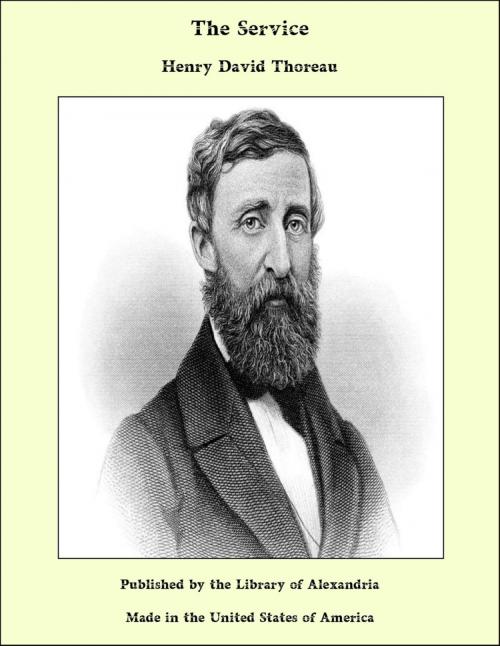| Author: | Henry David Thoreau | ISBN: | 9781465615480 |
| Publisher: | Library of Alexandria | Publication: | March 8, 2015 |
| Imprint: | Language: | English |
| Author: | Henry David Thoreau |
| ISBN: | 9781465615480 |
| Publisher: | Library of Alexandria |
| Publication: | March 8, 2015 |
| Imprint: | |
| Language: | English |
When some twenty years ago there were sent to me from the portfolios of Emerson papers by different friends of ours, I found among them an essay of twenty-two full manuscript pages, in the familiar script of Thoreau, tied together with knots of faded pink ribbon, like his College Commencement "part," but with no numbering of the pages. If made up, as it probably was (according to Thoreau's constant custom), from his Journals, the fact cannot be well ascertained, so many of the entries before 1841 having been destroyed or lost. More than any of his published writings, it displays that taste for paradox which often is found in authors of a singular originality, and of such a profound imagination as Thoreau had. Its form was perhaps suggested by the discourses on Peace and Non-resistance which in 1840 were so numerous in New England; while the native pugnacity of Thoreau provoked him to take up the cause of war and persist in the apostolic symbolism of the soldier of the Lord, and the Middle-Age crusader. Human life is his topic, and he views it with an Oriental scope of thought, in which distinctions of Time and Space are lost in the wide prospect of Eternity and Immortality. Curiously at variance with this is the play upon words,—a habit which he never outgrew; while his wonderful glances at outward nature, always interpreted symbolically of the spiritual life, indicate how early and intense was that perception of the aspects of the universe which first (and perhaps chiefly still) awakened an interest in Thoreau's pages. Characteristic, too, are his ecstasies concerning Music, of which he was ever the enthusiastic votary. Thus in a passage from some Journal, cited by Ellery Channing in his rich chaos of selections in "Thoreau the Poet-Naturalist," he says: "What a significant comment on our life is the least strain of music! When I hear music I fear no danger; I am invulnerable; I see no foe; I am related to the earliest times and the latest. I hear music below; it washes the dust off my life, and everything I look at. The field of my life becomes a boundless plain, glorious totread, with no death or disappointment at the end of it. In the light of this strain there is no Thou nor I. It paints the landscape suddenly; it is at once another land,—the abode of poetry."
When some twenty years ago there were sent to me from the portfolios of Emerson papers by different friends of ours, I found among them an essay of twenty-two full manuscript pages, in the familiar script of Thoreau, tied together with knots of faded pink ribbon, like his College Commencement "part," but with no numbering of the pages. If made up, as it probably was (according to Thoreau's constant custom), from his Journals, the fact cannot be well ascertained, so many of the entries before 1841 having been destroyed or lost. More than any of his published writings, it displays that taste for paradox which often is found in authors of a singular originality, and of such a profound imagination as Thoreau had. Its form was perhaps suggested by the discourses on Peace and Non-resistance which in 1840 were so numerous in New England; while the native pugnacity of Thoreau provoked him to take up the cause of war and persist in the apostolic symbolism of the soldier of the Lord, and the Middle-Age crusader. Human life is his topic, and he views it with an Oriental scope of thought, in which distinctions of Time and Space are lost in the wide prospect of Eternity and Immortality. Curiously at variance with this is the play upon words,—a habit which he never outgrew; while his wonderful glances at outward nature, always interpreted symbolically of the spiritual life, indicate how early and intense was that perception of the aspects of the universe which first (and perhaps chiefly still) awakened an interest in Thoreau's pages. Characteristic, too, are his ecstasies concerning Music, of which he was ever the enthusiastic votary. Thus in a passage from some Journal, cited by Ellery Channing in his rich chaos of selections in "Thoreau the Poet-Naturalist," he says: "What a significant comment on our life is the least strain of music! When I hear music I fear no danger; I am invulnerable; I see no foe; I am related to the earliest times and the latest. I hear music below; it washes the dust off my life, and everything I look at. The field of my life becomes a boundless plain, glorious totread, with no death or disappointment at the end of it. In the light of this strain there is no Thou nor I. It paints the landscape suddenly; it is at once another land,—the abode of poetry."















